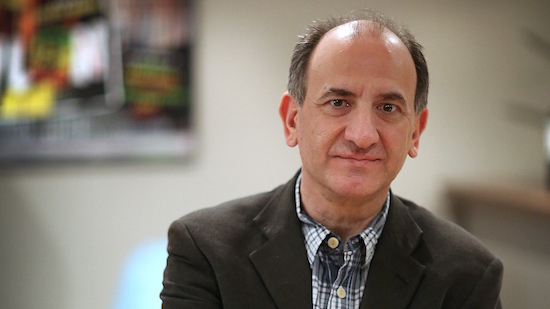As part of Glasgow’s Restless Natives Festival on May 14, A Badge of Friendship will be screening In The Loop, Armando Iannucci’s blistering satirical comedy based on his magnificently sweary BBC series The Thick Of It. Iannucci, co-creator of Alan Partridge and creator of Veep, writer on comedies including The Day Today and his own show, is something of a British comedy legend by now.
The man himself will also be taking part in a Q&A after the screening. Albeit in video form, as he’ll be out of the country working on an exciting new cinematic proposition – but more on that later.
Iannucci will have filmed an exclusive Q&A, in which he’ll be fielding questions asked on Twitter. To find out more, and discuss new projects, the Quietus caught up with him.
Could you tell me how you got involved with Restless Natives?
Armando Iannucci: They approached me about doing a screening of In The Loop and a Q&A afterwards. And they asked if I could come up and do it live, which normally I would, but I knew that on the day it was happening I was going to be somewhere else, out of the country. But I thought it’d be nice to do something. We talked about whether I could Skype but I just didn’t know whether I’d be able to on the day. So I thought, well, why don’t we just pre-record something? So the people can see me spouting on and on about the film afterwards – with the added advantage that they can heckle in any way they like, and it won’t disturb the performance.
How do you feel about In The Loop looking back? I know a lot of filmmakers don’t watch their work again…
AI: No I haven’t seen it since… Whenever you hear that, you think, ‘oh come on, you’ve spent all that time on it…’ But actually, you’ve sat with it for so long in an edit, three or four months, and then taken it around the country and the world, at premieres and so on, so you’ve seen it enough times to get physically sick of it. So actually I haven’t seen it since whenever it was, 2009. I think I will do at some point, watch it back. But I’m intrigued to see how it fits… I suspect that, far from being a sort of hysterical warning about the Middle East, it’s probably some very, very sombre factual document.
Do you watch any of your shows?
AI: No, I don’t. I mean occasionally I’m flicking through UKGold and I’ll see I’m Alan Partridge on, and you watch and realise you’ve completely forgotten what happens next. But then you’re also sat there going that bit went on too long, I should’ve cut it. I’m not absolutely allergic to it or anything but I don’t think of watching it. You just sort of move onto the next thing, really.
You’re working on a film about Stalin now, is that right?
AI: Yes, The Death Of Stalin. That’s why I’m not going to be able to be in Glasgow, I’m going to be somewhere in Eastern Europe. It’s based on true accounts of what happened in the Soviet Union on the day Stalin died, and the ten or so days afterwards when there was a massive power struggle in the Kremlin. And it’s interesting because it’s funny, but also quite terrifying at the same time.
And it’s new for me because, I mean I’ve always been fascinated by that particular era, but it’s new for me because it’s using actual, real figures rather than fictional characters. Something like The Thick Of It, yes there’s an element of familiarity with the real world but, fundamentally, it’s fiction. This involves people who were very well known, and it’s based on things they actually did. So it’s an interesting new process for me, which I’m really enjoying actually.
So tonally, it’ll be a comedy then?
AI: You’ll laugh but you’ll also feel slightly scared at the same time.
The best combination.
AI: And people who lived through that era, where if you just said the wrong thing or knew the wrong person you were carted away and shot, people lived in that place of gallows humour; just trying to work out how to get through the day, and more relevantly, the night. They did say that if you managed to survive until 4AM then they probably weren’t coming for you, and you could live to fight another day.
Have you got a Stalin yet?
AI: Well, he’s mostly dead. (Laughs)
Oh yeah. He’ll die pretty early on.
AI: Two lines and then he’s dead. But we’ve got a very good cast, can’t quite announce it yet because we’re sorting everything out but we’ve got a really good ensemble cast. I think people will be rather excited when they hear the combination of names.
When will it be out?
AI: Sometime early next year, I imagine.
I want to talk generally about satire; it seemed like after the 80s and 90s there came a sort of weird time in politics, where something like Spitting Image was no longer feasible because politicians weren’t the big personalities that they once were. But now it seems like we’re coming out of that, I mean we’ve got Boris Johnson, and Trump overseas, and Jeremy Corbyn…
AI: It’s a strange thing, it almost seems like anyone who doesn’t seem political in any way is at an advantage. It’s almost like anti-politics. A stage where anyone who acts – and it is an act – as if they have nothing to do with the way that daily politics works is lauded as some kind of superstar human being.
I think it’s a slightly crazy time actually, it’s very difficult to satirise because each of these politicians is in their own way enacting a commentary on the world of politics anyway. To then comment on them just feels like adding another layer. I find it very difficult to do jokes about current politics because for me it’s all about… I actually genuinely want people to be involved properly, you know? (laughs) I mean, the number of people who don’t vote… Frightening, really.
Something like The Thick Of It, focusing on people behind the scenes and policy, that seems almost alien to the way you would have to approach satirising these politicians.
AI: Yes, I mean it’s still very relevant to how politics works within government, but in terms of the way into politics for an outsider, no, I don’t think that would work. I don’t know what would, other than… people are going online, and finding the single issue topics. I mean, look at the junior doctors’ strike at the moment, or benefit cuts. That sort of cut across parties, and real pressure was felt in the government from inside and out.
So the whole party system has kind of collapsed. Party leaders can’t rely on their party for support – you’ve got the Conservative party divided over Europe, you’ve got Jeremy Corbyn dividing the Labour party, and I think the poor voter or non-voter thinks they’ve just got to get on with it themselves, and work out ways independently of what they want to campaign or fight for. So you get these ad hoc groups forming across party lines. And that’s interesting, but how long that’ll sustain itself I don’t know. That’s a very serious answer, I’m afraid.
What’s your opinion on the internet as a satirical tool? I remember in Veep laughing at Julie Louis Dreyfuss becoming a meme, and them saying, “you’ve become a meme, ma’am”…
AI: Well, it can be used to satirise – Cassetteboy are very good at mashing up George Osborne or whatever. But you know, Donald Trump uses it very effectively to just stir up those things that Donald Trump’s stirring up. It’s a tool, you judge it not by what it is of itself but by the type of person using it and what they’re doing with it. It’s open to abuse as well as use.
But what it is doing, I think, is telling a lot of people that you don’t have to have a lot of money to mount a campaign. You don’t have to be one of the Koch brothers, or Lord Ashcroft here, to put together a creative campaign. You have to think, have interesting thoughts, and apply yourself, but the tools are now available. And it may lead to getting things done, but may also lead to very hysterical mass-movements, and bullying. It’s in a slightly uncontrolled phase.
I’d be interested to know if you see things in the news that tempt you to revisit The Thick Of It.
AI: Honestly, no, I just feel like we drew a line under that whenever it was, two or three years ago. And that felt right. I always think you’ve just got to move on. If you keep wallowing in the thing that you’ve done for a while you get a bit stale.
Is there anything else you’re working on at the moment?
AI: I’m working on a comedy script about artificial intelligence for a movie, probably next year? It’s for a US studio, but I’ll probably end up shooting it in the UK. And I’m talking to HBO about doing something new, which I’ll shoot in the UK… A lot of things brewing. But Stalin’s taking up a lot of my time too.
In The Loop, followed by the Q&A, will be screened on Saturday 14 May at Drygate. Tickets are available on the Restless Natives website.



